'Legitimate Defense':
Hunting, Execution, and Self-Defense from Piñera's "Black February" to the Combative March
Vitrina Dystópica
A dispatch from the Chilean collective Vitrina Dystópica on the concept of "legitimate defense," that civilizing principle through which neoliberal capital authorizes its predatory "total war" against the specters of the October 19 revolt.
Other languages: Español
The writing of this text was begun in Panguipulli a few days after juggler, traveler, and artisan Francisco Martínez was murdered for defying an arbitrary identity control 1. Moved by the horror, we tried to link up with the local responses that his murder provoked. It felt necessary to take a position, to develop an alliance with the story of his life and the daily combat that his street art expressed, which had turned him into the newest target of Chile’s perverse oligarchic hunting machine. Through the ashes of fires and barricades, we struggled to keep our gaze steady and persist in the face of inexpressible impotence before the facts. The fires had barely begun to cool when the state’s hunting and rendition apparatus once again went on the offensive. As it turned out, Francisco (or "El Tibet," as his comrades called him) would be only the first in a series of executions throughout the month of February, casualties of what the architects of neoliberal genocide describe a "war against a powerful enemy," i.e., a war against those multiple, anonymous and restless forces of the rebellion of October 19 2.
Proper Names of a Common “February”
Only three days had passed since Francisco's murder when, sidestepping the systematic manipulation of information about the facts, news broke through social media of the "suicide" of a young man inside a police station in Pedro Aguirre Cerda, a working class district of Santiago 3. Camilo Miyaki, 27 years old, had been arrested along with his partner for not carrying the necessary “safe conduct” permits to travel on public roads during quarantine. After being released, his partner returned to the police station to leave food for him, only to be informed of his supposed hanging. Nothing in Camilo’s background predicted such a terrible outcome — of course, the same cannot be said of the police commissioner, who has been involved in multiple cases of torture and sexual harassment since the "social upsurge” began, all of which generated little to no public debate or political accountability. Unlike the mediatic public execution of Francisco, the truth about Camilo's crime is trapped inside an institution that, to date, has been involved in the verified staging of hoaxes and entrapment, manipulation of public information, and tax theft.
A week later, while the discussion in social media was still dizzy with the need to settle the circumstances and conditions of both acts of violence, Panguipulli was once again the object of social attention. In the Desagüe Riñihue sector, the Lof Llazcawe, a Mapuche community was in the process of retaking control of their territory when they suffered an armed attack by private guards of a luxury private condominium held by the local oligarchy. A few months prior, the Mapuche community had liberated several privatized beaches, allowing people from working class sectors to have free use of the lake located in ancestral indigenous territory. On February 17th, an extralegal order sought to forcibly expel the campers who had decided to spend the night in the area. Upon observing the attack and hearing the request for support, the Mapuche community was determined to defend the campers. Their effort to defend their right to common use of the land led to a shooting attack that killed Emilia Milen Herrera, a young trans* lamgen via a gunshot wound to the head 4.
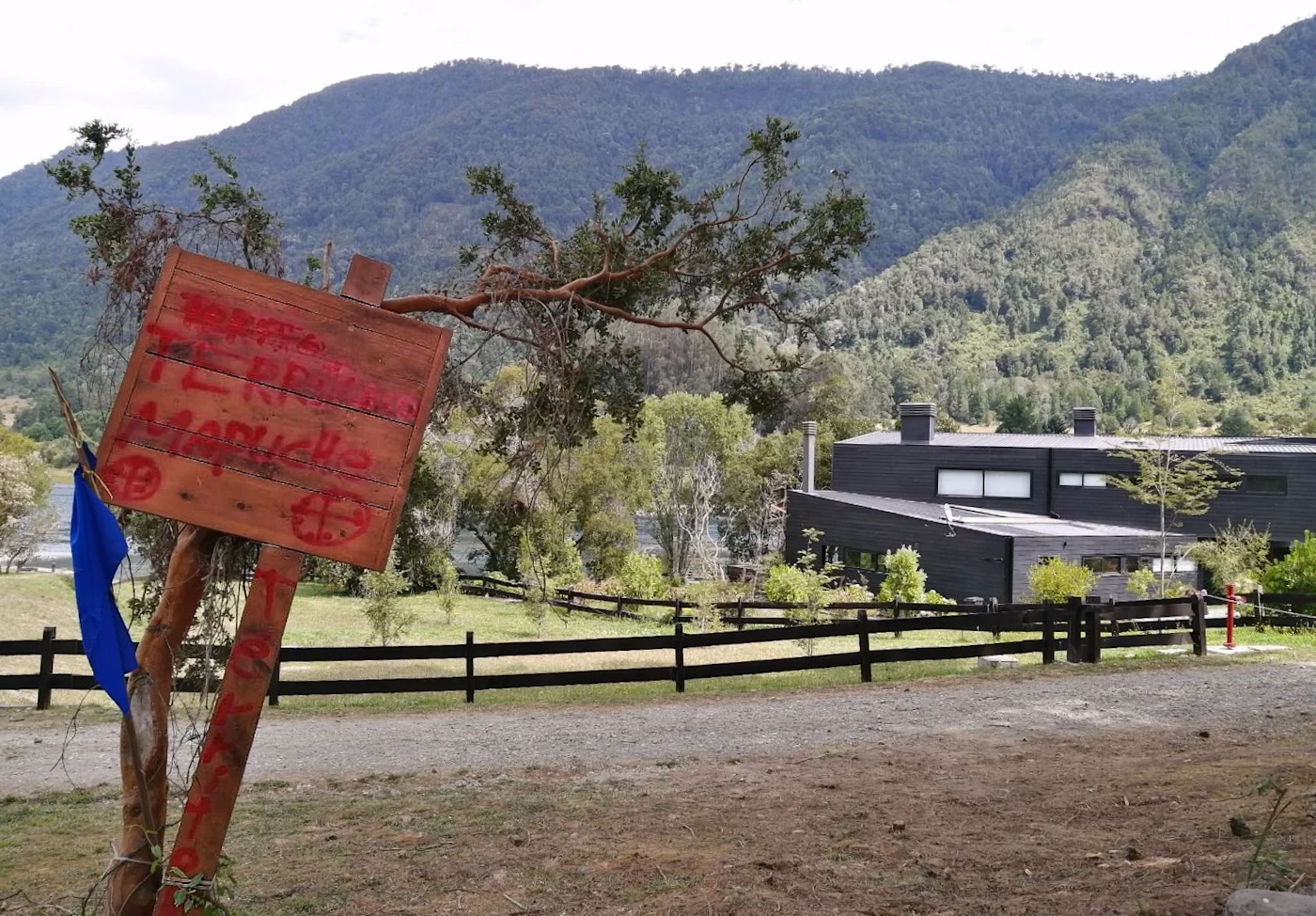
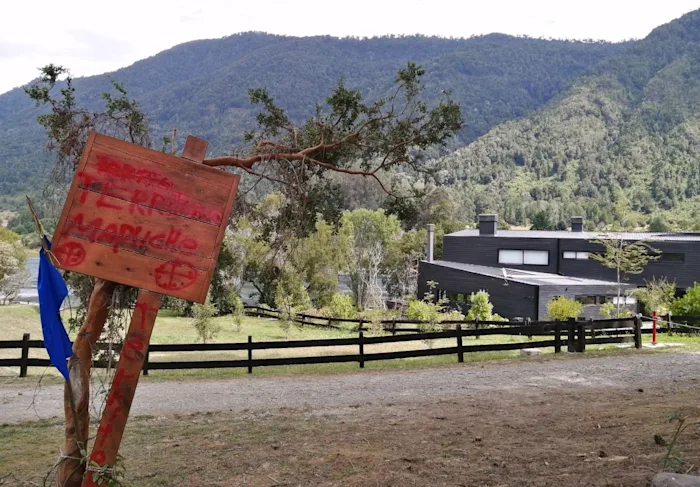
Only one day before Emilia's murder, the Chilean Minister of Economy, a militant of the fascist-friendly extreme-right party (UDI) gave a belligerent interview in a conservative media outlet about the sanitary debate over the much-talked-about "return to normality," in which he stated that "the teachers seek by all means not to return to work.” Three days later, in the middle of the mobilizations in Plaza Dignidad that have continued to take place every Friday since October 18th, Francisca Mendoza, a philosophy teacher who was holding up a poster with the question: "Lazy, me?” would be the next victim of ocular mutilation by carabineros.
Hunting and Killing: the "Legitimate Defense" of Capital
Francisca, Emilia, Camilo, and Francisco are the proper names by which Piñera’s bloodthirsty February inaugurates and consummates a certain mode of producing its enemies amidst the ongoing crisis of the "Chilean" model of neoliberalism, a crisis both imminent and immanent. In spite of its continuities with the past, they testify to a tactical intensification of the war waged against a "powerful and implacable enemy that respects nothing and nobody," as the little dictator with short arms dictated on October 18th. A war waged against a “faceless” enemy lacking any clear ideological contours, identifiable only by the defiant, threatening, and restless disruptions by which this unclassifiable force opens small islands of meaninglessness illegible to the normality of capital.
We speak not only of gestures but of proper names that express a daily combat, a persistent creation of different ways of living and appearing that challenge those of capital. It was something we intuited already a few years ago, in the midst of the molecular revolts in Chile against the extractivist disaster: such names express a common malaise, indocile to the civilizing norms mediated by consumption and individualization, to the institutional sadism and the meritorious masochism of neoliberal democracy 5. More than mere gestures, what is in question are forms of life, wild experiments of politicizing daily misery that harbor an unremitting capacity to affectively incline total strangers to gather together and involve one another in the knowledge they have gleaned from daily struggle.
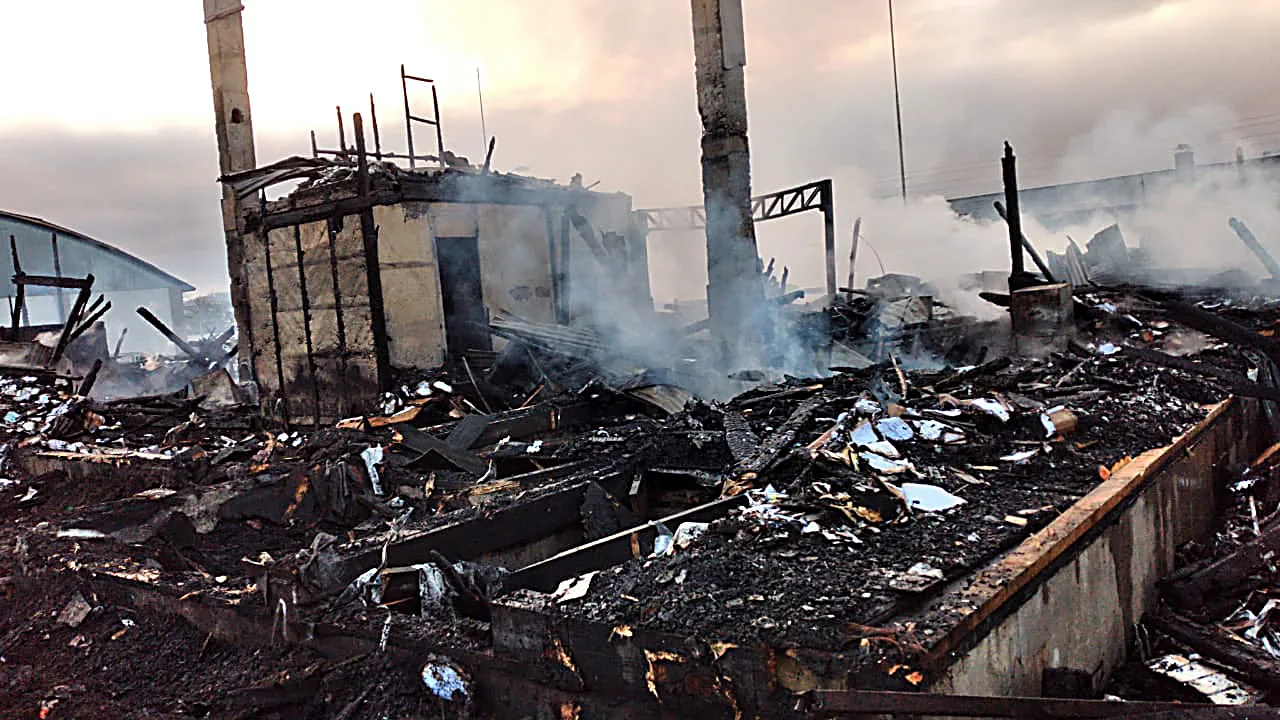
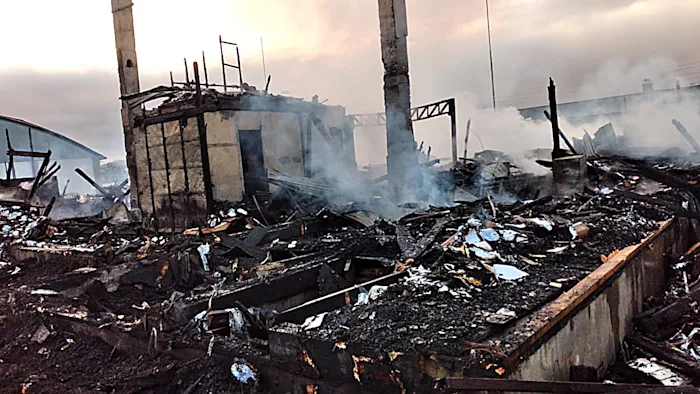
In Panguipulli the ashes of the municipality were still fresh, you could smell them from some distance away. The barricades lining the street had still not been removed. The anticipation surrounding Francisco's animita drew people from multiple generations, travelers, tourists and locals, all of whom sought to contribute to a collective effort in memory 6. As we stood in front of the floral offerings, "witnesses" would walk up and begin to speak aloud about what happened. There was no truth to be sought: the videos flooded the social networks, there were no doubts about the horror. Rather, it seemed to be a collective effort to name or simply murmur the scene of abject cruelty displayed that afternoon, when a policeman had shot a well-known juggler at point blank range in the middle of a street teeming with people. Those of us who found ourselves there for the first and perhaps the last time sought to catch sight of the voluptuousness of his life, to give it a name different from the threatening categories decreed by the "tourism business leaders" against "backpackers," "artisans," and all those "undesirables" who need to be identified and controlled 7.
Since the "social outburst" the fabrication of the so-called "powerful enemy" has been the aegis of the watchdogs of the Chilean corporate-state. Conspiracy theories, fraudulent intelligence reports, judicial and media hoaxes have been unable to contain the power of gathering and defiance convoked by the malaise that condenses itself our memories of our dead, let alone define an enemy.
However, in February, when the perversity and impotence of their democratic apparatuses of persecution and dissipation were laid bare, they did not hesitate to bluntly expose their justification for the hunt: "legitimate defense." This is the "sanitary” rationale by which they have justified Camilo's imprisonment and "suicide" in a police station, all because he did not have with him a ‘safe passage’ permit. This same "self-defense" on the part of a paco assassin justified riddling Francisco with bullets when this cop felt threatened by his juggling pins 8. And it is the same sort of "legitimate defense" on behalf of private condominium owners against the occupants of “their” beach that justified the execution of Emilia by private guards. And let us not forget that it was the legitimate defense of a military policeman that justified the murder of Camilo Catrillanca, after an "alleged car robbery." Will it be the self-defense of the Chilean education industry that justifies the mutilation of Francisca?
In much the same way, Piñera's bloody February cruelly exposes the justificatory framework for the more than 400 mutilated, murdered, and tortured since October 18th. Undoubtedly the same justification is applied to the dozens of Mapuche murdered and imprisoned by neoliberal progressivism during the thirty years of transition. This familiar rationale is even noticeable in the line adopted toward the 1973 coup d'état by the party that would later take hold of Chile’s transition to democracy, when they interpret the “military pronouncement” of September 11th as “legitimate defense." In short, “legitimate defense” names the civilizing principle, the ordering framework through which neoliberal democracy institutes total war as a strategy for managing its own crises.
The "legitimate defense" of property serves as the argument establishing the government's position, in the macro-political sphere, from which it will oppose the constituent process and the mobilizations to come. More generally, it offers the justification for the oligopolistic violence (both civil and military, as in '73) directed against the molecular or micropolitical dimension and in defense of its own civilizational nature, a way of life robbed of the potency of its own self-defense. As one of today’s "young" fascists recently put it, speaking of the closing of a "traditional restaurant" located in the ground zero of the demonstrations: a "violent and pyromaniac orgy that pierces neighbors and tenants who are already tired of seeing the city that they cultivated with love transformed.” It is against this libidinal power, this rebellious eroticism of revolt, anonymous and uncapturable, the infectious desire for forms of social cohabitation and belonging that challenge the prudish norm of life under capital, that today’s democratic violence is directed.
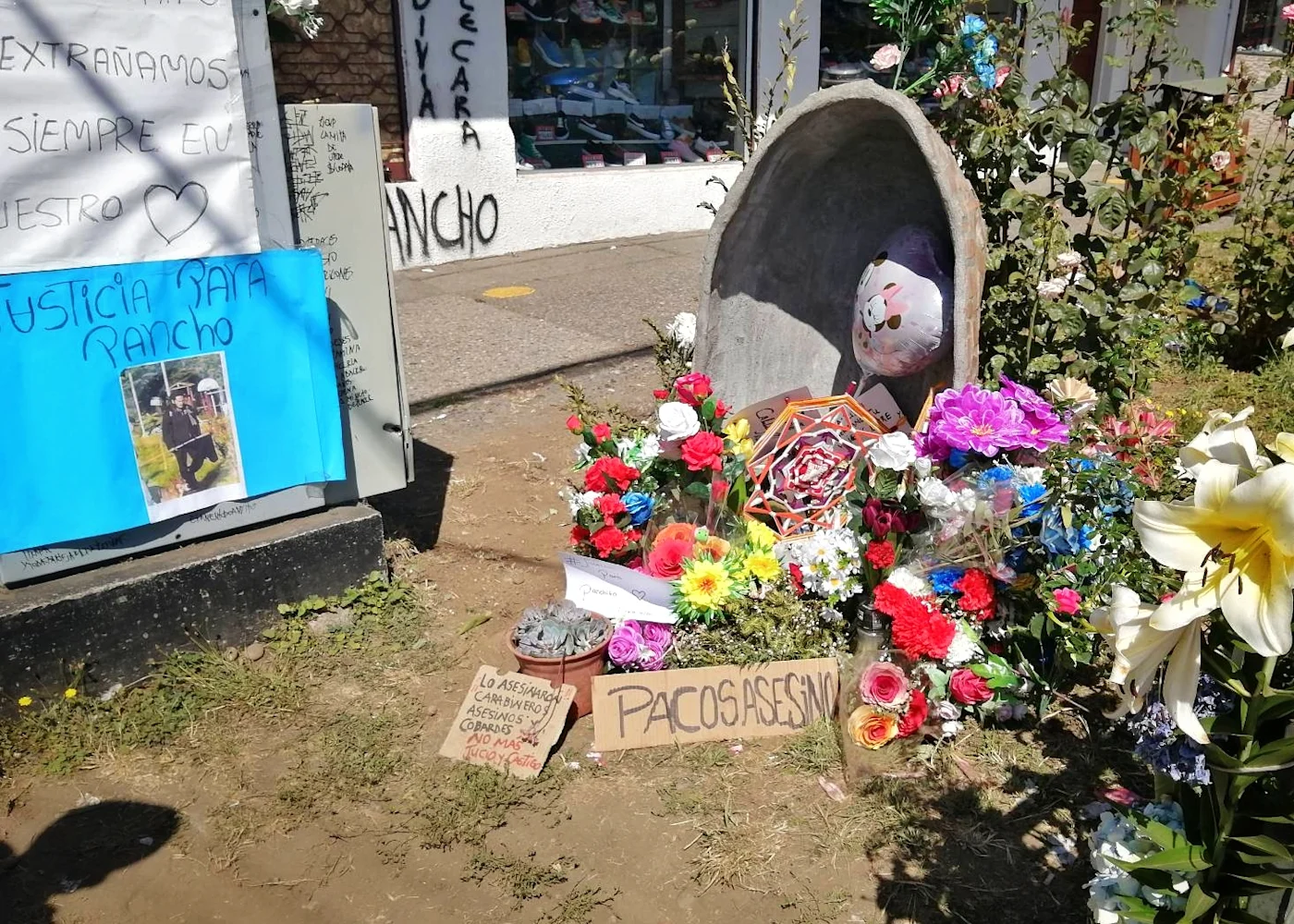
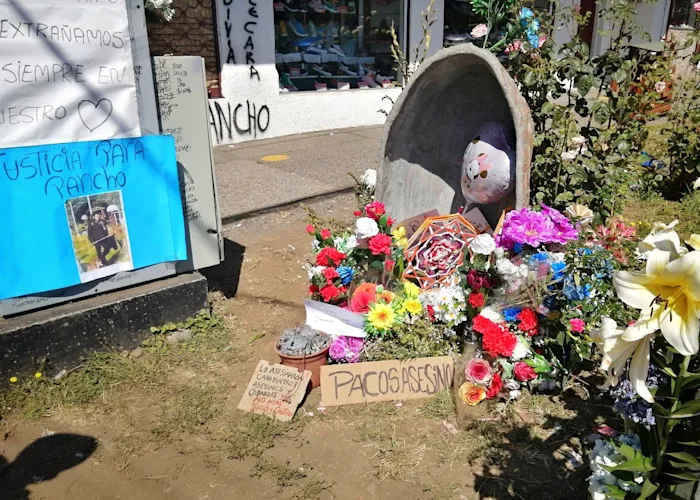
The property they defend is not reducible to merchandise or to the fixed capital of this or that bourgeois with a first and last name. What they defend is the very principle of individual capitalization that sustains the Chilean economic-moral infrastructure. Whether it be on public roads, inside police stations, or in hospitals when they are unable to pay for the oxygen sustaining them, it is this principle that determines which bodies have accumulated enough social credit to avoid being hunted and executed and which have not. The same axiom, in turn, permits socially legitimized bodies to defend or be defended, since it confers on them the right to execute an oligopolistic violence that is at once legal, media, police, financial and, above all, epistemic.
Civilizing War
Francisco, Bau, Camilo and Francisca are proper names that have become common. They are lamentable echoes of the names of Macarena Valdés and Santiago Maldonado around which we gather again. All bodies that experience an affective inclination toward the discomfort of other anonymous bodies will be publicly discredited by the civilizing norm of individual capitalization, or executed in "legitimate defense" of the neoliberal mode of life. Each of them, a differentiated sensible weft of experiences of violence and violation. Each of them, the living memory of daily combats that make them targets of the state’s hunting apparatus. Each of them, epistemes of the common that stand in conflict with corporate epistemes, all of which are sexual, racial, ageist and classist. Such bodies testify to a form of combat against the corporatist norm of docility, plunder and rendition that enshrines the principle of "legitimate defense" and privatization in all realms of daily life, designed to crush any expression of territorial self-defense that seeks to communize itself. It matters little whether the territory in question is a beach or one’s own body, as in the case of Bau, a street corner inhibited by an errant form of work, as in the case of Francisco, the street you live on, as in the case of Camilo, or in a square in which people gather for the defense of public education, as in Francisca Mendoza's ocular mutilation. In Chile, it’s obvious that ocular mutilations have not been exceptional events, as the Piñera government seeks to present them to the international community, but are a concrete expression of the "exercise of legitimate self-defense.” They represent a systematic tactic deployed by the state’s hunting apparatus aimed less at the alleged "subjects" provoking violence than at the dissipation and terrorization of the disruptive forces of unrest that, in spite of everything, continue to gather in potent revolt since October 19.
Just as we know that proper names are not only gestures but forms of life in daily combat against the civilizing norm of individual capitalization, we know that the object of this hunting and plundering are not "subjects" that oppose the state through direct ideological antagonism, but collective processes around which different epistemes seek to gather, persist, name, and escape from the manufacturing process with which they are disposed as dangerous. What is in question in its militancy is not trench warfare or a military discipline, but a squatting or occupation of time and territory: the city, fields and bodies, friendships, afternoons, loves — smiles, desires, nerves and muscles. In this occupation of the imagination by landscapes, concepts, and images, there is no separation or opposition between everyday life and the spellbinding homespun artifacts with which we make our way with others amidst the storm of indebtedness, misery, and precariousness.
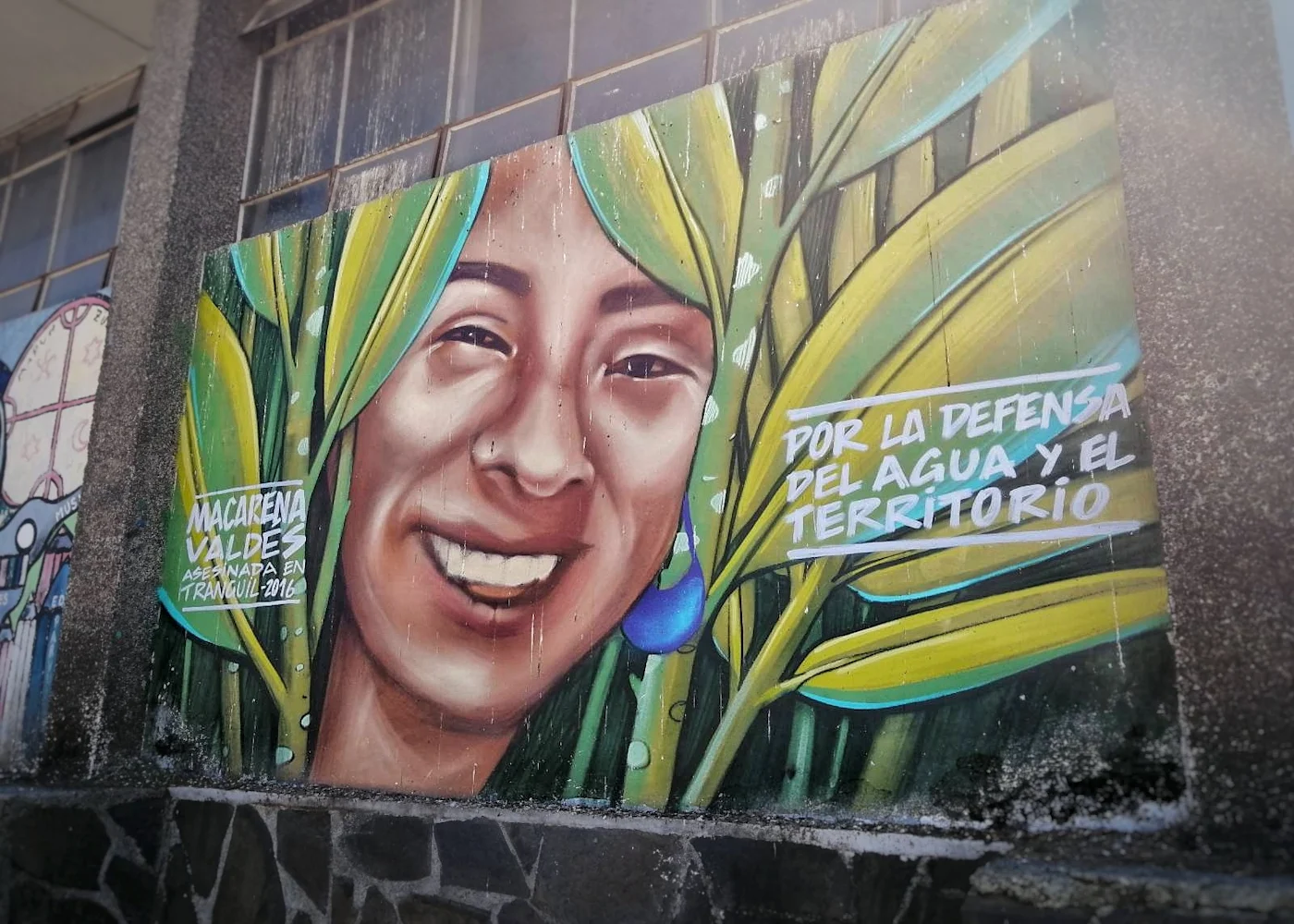
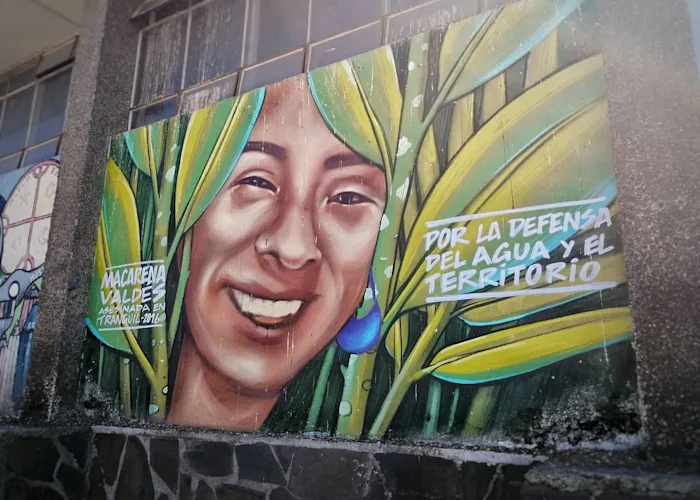
March will be a time of newfound memory and struggle. The Day of the Young Combatant 9 will serve as an untimely meeting point between the young combatants of 1985 and the dead of February, those mutilated, murdered and tortured since the social outburst, those murdered by neoliberal health management, and the hundreds of social fighters executed with impunity by extractivism and neoliberal progressivism. It will be a March in which the principle of "legitimate self-defense" unleashes a civilizational campaign inscribed in a planetary civil war for the defense of the neoliberal mode of life. These struggles are not reducible to transformations of the economic model, but call for a sharing of offensive practices of care capable of dismantling the corporate episteme and its machinic manufacture of "threatening" environments.
In the face of bewilderment and disorientation, the paralysis of thought in the face of the horror of oligopolistic violence must not allow us to fall back upon reductionist interpretations. We must remain strategically suspicious of any hope placed in a "defense" of or by the neoliberal legal machinery. Our bodies, hewn by the joy and pleasures of daily struggle, will defy the compact by which they seek to pacify our desire to live differently. Our aberrant anomalies do not speak the same libidinal language of plunder and surrender by which they seek to mould us into docile individual "corporations." Nor are they martyriological wagers, since we do not hope to die, nor do we need to await any further deaths to reveal the truth about ruling powers. There is no secret to be revealed in the declaration of "legitimate defense." On the contrary, there is only the historical gravity of a total struggle for the end of their world, a struggle that extends from every territory to every nerve. An epistemo-political combat, as we say, a defiance that extends from muscle to muscle against the sensible obturation by which they seek to neutralize and to antagonize the offensive capacities of care that we experience.
This being so, what is becoming clear to us above all is that, whereas their love produces only horror and their "legitimate defense" only our manhunt, it is the voluptuous eroticism of our violence that they fear so much, a destructive and pyromaniac orgy that carries within it a capacity to transform worlds, the only force that can give shelter to our irremediable desire for the end of THEIR world, and which is nothing other than the proliferation of millions.
Translated by Ill Will
Featured image: the Municipal Center of Panguipulli burns after being torched by protesters.
Notes
1. To understand the background of oligopolistic violence in the commune of Panguipulli, see our interview with historian and resident in the commune, Ignacio Ayala, which was taken the same day and in the same commune that Bau, Emilia Milen, was murdered.↰
2. See Vitrina Dystópica, “Virulencias de cuidado: De la revuelta y otros contagios” (Virulences of care: Of revolt and other contagions). Online here. ↰
3. Among the attacks made by the bot agencies on social networks seeking to "justify" Francisco's murder to the public opinion by associating it with criminal causes, the falsification of Francisco's criminal record document by the police officer's defense attorney is of particular relevance. ↰
4. Lagmen is a Mapuzungun word used as an appellative, among other things, to call a Mapuche woman in a friendly way. It is also a sign of affection and ethical-political respect. ↰
5. "Amistades transfronterizas e inclinaciones estratégicas: intuiciones en torno al devenir molecular de la subversión en Chile.” ("Cross-border friendships and strategic inclinations: insights into the molecular evolution of subversion in Chile"). Online here. Also in Castellano, here.↰
6. Animita is the term popularly used to "refer to a place of religious or mythological veneration, generally developed as a chapel, hermitage, sanctuary or shrine, which recalls a tragic event in public space. It is also established as a place of informal veneration of saints or characters to whom some otherwordly characteristic is attributed" (https://es.wikipedia.org/wiki/Animita).↰
7. Panguipulli is a town located in Mapuche territory, Wallmapu. Unlike other territories characterized by the presence of forestry projects or landowners with communities, the city of Panguipulli is a residential sector of the great colonial oligarchy of the area, where the development objective of the city is mainly tourist gentrification. The atmosphere of persecution and suspicion with the "irregular traveler" is where Francisco's "identity control" is inscribed. ↰
8. “Paco”: a widely-used and defiant way of referring to Carabineros, akin to calling police “pigs.”↰
9. A day of protests taking place throughout the country in memory of all resistant youths murdered for fighting against the Pinochet dictatorship. It has been held since March 29, 1985, the date of the assassination of the brothers Eduardo and Rafael Vergara Toledo, who were shot in the vicinity of the historic popular neighborhood Villa Francia. After the transition, protests have been continued to be held to vindicate the young men and women assassinated by current day neoliberal democracy.↰